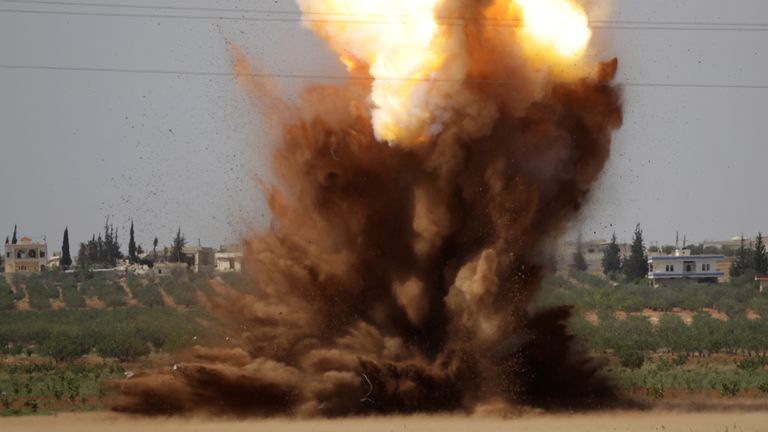Ukraine War
Ukraine Starts Shelling Russians With US Cluster Bombs
The White House has confirmed that Ukraine has started using US cluster bombs supplied by Joe Biden against Russian forces operating within the nation. According to National Security Spokesman John Kirby, preliminary input indicates that they are being deployed “effectively” against Russian defensive locations and operations.
Cluster bombs disperse many bomblets and are prohibited in over 100 countries due to the danger they pose to civilians. Joe Biden agreed to send them in order to supplement Ukrainian munitions stockpiles.
Ukraine has committed to use the explosives only to dislodge concentrations of Russian enemy soldiers.
“They are using them appropriately,” Mr Kirby stated. “They’re using them effectively, and they’re having an effect on Russia’s defensive formations and defensive maneuvering.” “I think I’ll leave it there.”
After Ukraine warned that it was running out of ammunition during its summer counter-offensive, which has been slower and more expensive than many had imagined, the US opted to supply cluster bombs.
President Joe Biden described the decision as “very difficult,” as the United Kingdom, Canada, New Zealand, and Spain all opposed their use.
The vast majority are artillery shells with a “dud rate” of less than 2.35%, which refers to the fraction of bomblets that do not explode immediately and can pose a threat for years.
When employed against troops in trenches and entrenched positions, the weapons make enormous regions too dangerous to move around in until cleared.Since its full-scale invasion of Ukraine last year, Russia has employed identical cluster bombs, even in civilian areas.
In response to the United States’ plan to send the bombs, Russian President Vladimir Putin stated that his country possesses similar weapons and that they would be used “if they are used against us.”
The Ukrainian commander in charge of operations in the country’s east, Oleksandr Syrskyi, told the BBC last week that his forces needed the weaponry to “inflict maximum damage on enemy infantry.”
“We’d like to get results quickly, but it’s practically impossible.” “The more infantry who die here, the more their relatives in Russia will question their government, ‘why?'”
However, he warned that cluster bombs would not “solve all of our problems.”
He also admitted that their usage was problematic, but added, “If the Russians didn’t use them, perhaps conscience would not allow us to do it too.”
Cluster Bombs Forbidden
Cluster bombs are munitions that contain a number of tiny explosive submunitions or bomblets. During the bomb’s descent, these bomblets are scattered over a large region, generally by a parachute or other dispersal mechanism. The goal is to cover a bigger target area and enhance the likelihood of striking several targets inside that area. Cluster bombs are typically delivered by aeroplanes, although they can also be launched by artillery systems on the ground.
Cluster bombs have sparked debate due to their extensive impact and the dangers they represent to civilians. When these submunitions fail to detonate on impact, they might become de facto landmines, posing serious risks to populations, particularly after conflicts have concluded. For these reasons, many countries and international organisations have condemned the use of cluster bombs.
To address the humanitarian problems raised by cluster munitions, the Convention on Cluster Munitions (CCM) was signed in 2008. The CCM forbids the use, manufacture, transfer, and stockpiling of cluster munitions, as well as the clearing and destruction of existing stocks.
In May 2008, 107 countries signed an international pact outlawing these weapons. The negotiations that led up to this were part of the “Oslo Process,” a Norwegian initiative that aimed to conclude a convention on cluster munitions by the end of 2008. The Convention was open for signature on December 3, 2008, and went into effect on August 1, 2010.
The Convention, an important addition to international humanitarian law (IHL), strengthens fundamental customary IHL standards that apply to all governments. These norms compel conflict parties to distinguish between civilians and combatants at all times, to conduct actions only against military targets, and to take constant care to spare civilians and civilian objects.
Cluster munitions, like bursting and expanding bullets, chemical and biological weapons, anti-personnel mines, weapons using undetectable fragments, and blinding lasers, are considered weapons prohibited under IHL.






























